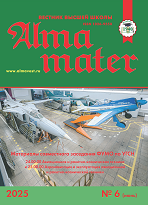UDC 130.2:177
https://doi.org/10.20339/AM.03-23.102
Anna S. Petrakova, Cand. Sci. (Philosophy) at Academy of Marketing and Social and Information Technologies — IMSIT, Krasnodar, e-mail: petrakova_1984@list.ru
The problem of identity formation is, of course, important for every individual. The process of constructing an identification basis is influenced by many factors, among which the main ones are belonging to an ethnic group, state, religion, culture. The article deals with the problem of understanding and formation of modern Russian identity. The author argues that its basis is a constructive synthesis of ethnic and national elements, since the former are dictated by a common origin, territory of residence, language, culture, and the latter, in turn, go back to statehood and citizenship, and are also conditioned by a single value-semantic and legal field. The author pays special attention to the consideration of Russian identity in a civilizational aspect, pointing out that the identification basis for Russian citizens is the spiritual and moral values inherent in the Russian people in their multicultural totality, namely collectivism, catholicity, mutual assistance, mutual assistance, a sense of civic solidarity. At the same time, a special specific feature of the Russian identity, according to the author, is also the belief in the absolute social organizing principle of the state, which explains the inclination of citizens to put, first of all, the administrative decisions of the authorities at the forefront.
Keywords: identification, identity, Russian identity, statehood, citizenship, spiritual and moral values, multiculturalism, multiformity.
References
1. Speech of His Holiness Patriarch Kirill at the opening of the XVII World Russian People’s Council. URL: http://www.patriarchia.ru/db/text/3334783.html (accessed on: 06.12.2022).
2. Galimova, I.M. The concept of national-state identity in academic discourse. Vestnik of the Perm State University. Ser. Political science. 2011. Iss. 3 (15). URL: https://cyberleninka.ru/article/n/kontsept-natsionalno-gosudarstvennoy-i... (accessed on: 04.12.2022).
3. Denisova, G.S., Lubsky, A.V., Voitenko, V.P. Russian Identity as a Subject of Research Practices. Vestnik of the ASU. 2018. No. 4 (229). P. 127–138.
4. Drobizheva, L.M. Meanings of All-Russian Civil Identity in the Mass Consciousness of Russians. Public Opinion Monitoring: Economic and Social Changes. 2020. No. 4. P. 480–498.
5. Zheleznyakov, A.S., Litvinova, T.N. The problem of the formation of Russian national identity in the context of ethnic diversity. Reforming Russia. 2012. No. 11. P. 367–383.
6. Malinkin, A. New Russian Identity: Studies in the Sociology of Knowledge. Sociological Journal. 2001. No. 4. P. 66–86.
7. Ryzhova, S.V. Ethnic identity in the social dimension. Sociological science and social practice. 2020. V. 8. No. 3. P. 165–181.
8. Tishkov, V. What is a nation. In Search of Russian Identity. Nezavisimaya Gazeta. 2017. URL: https://www.tuva.asia/news/russia/8911-tishkov.html (accessed on: 05.12.2022).
9. Smith, A. The Ethnic Sources of Nationalism. Survival, Spring, 1993.











.png)






